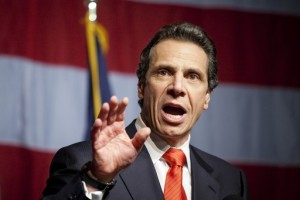
New York Gov. Andrew Cuomo has made a 2% property-tax cap a centerpiece of his new administration. The state’s local taxes are now 79 percent above the national average, making them the highest among the 50 states. Residents and businesses alike agree something has to be done. However, there remains great debate on whether or not a tax cap is the best solution.
At first blush, the cap would seem to address the most direct cause of the financial pain. Taxes are high and continue to rise in excess of the rate of inflation. Stop that. But considered from the municipality’s point of view, this constrains revenue, but not spending.
There should be a relationship between revenue and spending, but for counties, towns, and school districts in New York many programs are mandated by the state or the federal government. Mandates include special education, which at more than $24,000 per student is far more expensive in New York than in most other states. And lawmakers have added 257 additional requirements to federal disabilities laws, according to the Citizens Budget Commission. Further, school and municipal retirement and health insurance programs are set up by the state, but paid for locally.
This means that much of the spending is not under the control of the governments whose revenue has just been capped. Local communities cannot run in deficit, meaning that non-mandated spending must be cut or the state must start providing funding for the mandates it has issued. If the state doesn’t step up, expect layoffs of teachers, firemen, and police. Road and sidewalk maintenance will be curtailed. Playgrounds, community centers, and other popular local services and facilities will suffer.
The bet is that the dysfunctional NY state legislature won’t allow the local communities to suffer and will approve state spending to cover mandates. But this is the same legislature who must pass the property tax cap. In essence, they would be approving a tax cap in an effort to force themselves to approve paying for mandates. Wouldn’t a sane body just deal with the mandates rather than trying to hold itself hostage?
Complicating this matter is Cuomo’s proposal that a 60% majority of local voters could pass a resolution to exceed the cap. The likely result being that relatively affluent communities would opt to maintain the schools and community programs in their area, while less economically able areas would have to suffer the loss of services. So the legislative bet is really that Albany will step in to prevent the economic suffering in the poorer regions of the state. Given Albany’s history, there will be long odds on that wager.
It may well be that the property tax cap is the only program Cuomo can get passed. The legislature has ignored the mandate problem for decades, and there’s no reason to believe they will act without some sort of leverage. This may be the best tool available. But citizens should be aware that while it sounds like a tax cap is in their best interests, the real objective is to create local pain such that Albany can be spurred to action. If they act, they will be rescuing you from themselves—a result they are completely capable of doing without making you suffer in the first place.
